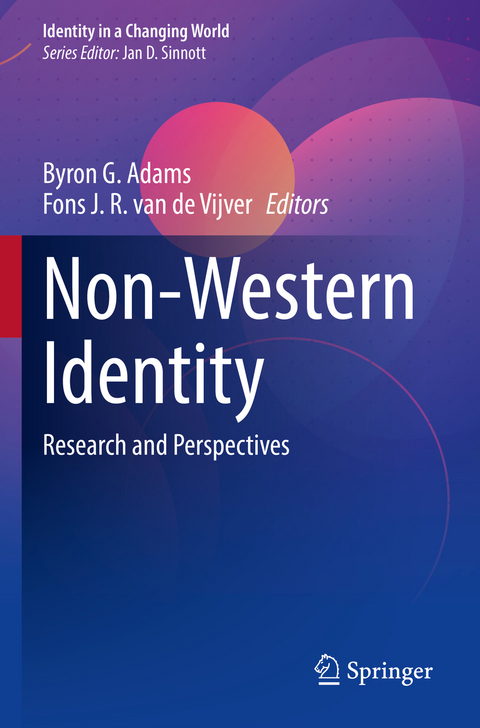
Non-Western Identity
Springer International Publishing (Verlag)
978-3-030-77241-3 (ISBN)
Identity is a construct strongly rooted and still predominantly studied in Western (or WEIRD; Western, educated, industrialized, rich, and democratic) contexts (e.g., North American and Western European). Only recently has there been more of a conscious effort to study identity in non-Western (or non-WEIRD) contexts. This edited volume investigates identity from primarily a non-Western perspective by studying non-Western contexts and non-Western, minority, or immigrant groups living in Western contexts. The contributions (a) examine different aspects of identity (e.g., personal identity, socialidentity, online identity) as either independent or interrelated constructs; (b) consider the associations of these constructs with aspects of intergroup relations, acculturative processes, and/or psychological well-being; (c) document the advancement in research on identity in underrepresented groups, contexts, and regions such as Africa, Asia, Eastern Europe, the Middle East, and South America; and (d) evaluate different approaches to the study of identity and the implications thereof. This book is intended for cultural or cross-cultural academics, practitioners, educators, social workers, postgraduate students, undergraduate students, and scholars interested in studying identity. It provides insight into how identity in non-Western groups and contexts may both be informed by and may inform Western theoretical perspectives.
lt;p>Byron G. Adams is an Industrial Psychologist from Johannesburg, South Africa. He holds a Ph.D. from Tilburg University, the Netherlands. He is currently an Assistant Professor of Work and Organizational Psychology at Tilburg University, the Netherlands and a Senior Research Associate at the University of Johannesburg, South Africa. His research interests include the study of identity across different groups (i.e., cultural, gender, and national groups), life stages (i.e., adolescents and emerging adults) and life domains (i.e., school and work). He considers how identity informs psychosocial functioning, in particular as related to inclusion, discrimination, and well-being. He currently serves on the Governing Council for the Society of Emerging Adulthood has published in such journals as the Journal of Cross-Cultural Psychology, Assessment, and the International Journal of Intercultural Relations.
Fons van de Vijver holds a chair in cross-cultural psychology at Tilburg University, the Netherlands and an extraordinary chair at North-West University, South Africa, and the University of Queensland, Australia. He has (co-)authored more than 500 publications, mainly in the domain of cross-cultural psychology. The main topics in his research involve bias and equivalence, psychological acculturation and multiculturalism, cognitive similarities and differences, response styles, translations and adaptations. He is the former editor of the Journal of Cross-Cultural Psychology. He is a former president of Division 2 (Assessment and Evaluation) of the International Association of Applied Psychology, the European Association of Psychological Assessment, and President of the International Association for Cross-Cultural Psychology. He is the 2013 recipient of the International Award of the American Psychological Association (for his contributions to international cooperation and to the advancement of knowledge of psychology).
Introduction.- Part 1: Identity in Underrepresented World Regions and Contexts.- Identity in Sub-Saharan Africa.- Identity Development in East Asia.- My Social, Political, and Hybrid Self: Identity in Central and South America.- Caribbean SHIFT: A Theory of Cultural Identity for Caribbean People and Diaspora.- National and Ethnoreligious Identities in Multicultural Mauritius: Group Positions and Belonging.- Identities in the South Caucasus: Still Salient and Contested.- Multiple Social Identities in the Post-Soviet Context.- Part 2: Identity of Specific Non-Western group.- Roma Ethnic Identity: Who Is and Who Is Not Roma? Between Self-Defined and External Ethnic Identification.- Being a Muslim in the Western World: A Social Identity Perspective.- Falling Outside Identity: The Creation and Boundaries of Turkish National Identity and Its Consequences for Minorities.- Cathedrals of the Spirit: Indigenous Relational Cultural Identity and Social and Emotional Well-Being.- Part 3: Identity Perspectives Important for Non-Western Context.- Perspectives on Personal Identity Development in Western and Non-Western Contexts.- From the Self to the Selfie.- Variations in Sources of Self-Affirmation: What Can Be Learned From Non-Western Contexts.- Conceptualizing Work Identity in Non-Western Contexts.- Index.
| Erscheinungsdatum | 04.02.2022 |
|---|---|
| Reihe/Serie | Identity in a Changing World |
| Zusatzinfo | XXIII, 310 p. 7 illus., 3 illus. in color. |
| Verlagsort | Cham |
| Sprache | englisch |
| Maße | 155 x 235 mm |
| Gewicht | 661 g |
| Themenwelt | Geisteswissenschaften ► Psychologie ► Psychoanalyse / Tiefenpsychologie |
| Schlagworte | Being Muslim in the Western World • Decolonizing psychology of cultural identity • Identity development in Central and South America • Identity development in East Asia • Identity in Eastern Europe • Identity in non-Western contexts • Identity in South and Southeast Asia • Identity in Sub-Saharan Africa • Identity in the Caribbean • LGBT Identity in non-Western Contexts • Multidisciplinary perspective of conceptualizing identity • Native American Identity • Roma Ethnic Identity • Self-Affirmation in Diverse Groups • Selfies and Online Identity Practices • Social Identities in Post-Soviet Space • Tridimensional model of identity • White Identity in South Africa • Work Identity in non-Western Contexts |
| ISBN-10 | 3-030-77241-1 / 3030772411 |
| ISBN-13 | 978-3-030-77241-3 / 9783030772413 |
| Zustand | Neuware |
| Informationen gemäß Produktsicherheitsverordnung (GPSR) | |
| Haben Sie eine Frage zum Produkt? |
aus dem Bereich


